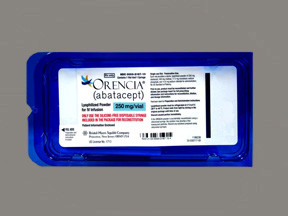ABATACEPT - INJECTION
PHONETIC PRONUNCIATION: (a-BAT-a-sept)
COMMON BRAND NAME(S): Orencia
GENERIC NAME(S): abatacept/maltose
Uses
USES: This medication is used to treat rheumatoid arthritis, a condition in which the body's own defense system (immune system) attacks healthy tissue. This leads to swelling in the joints, which causes pain and makes it harder to move. This medication is also used to treat other types of arthritis (such as juvenile idiopathic arthritis, psoriatic arthritis). Abatacept works by weakening your immune system. This effect helps to slow down joint damage and reduce joint pain and swelling so you can move better.
How to use ABATACEPT - INJECTION
HOW TO USE: Read the Patient Information Leaflet if available from your pharmacist before you start using abatacept and each time you get a refill. If you have any questions, ask your doctor or pharmacist. This medication is given by injection into a vein as directed by your doctor, usually over 30 minutes. It is usually given every 2 weeks for the first 3 doses, then every 4 weeks. The dosage is based on your medical condition, weight, and response to treatment. Use this medication regularly to get the most benefit from it. To help you remember, mark your calendar to keep track of when to receive the next dose. Tell your doctor if your symptoms do not get better or if they get worse.
Side Effects
Precautions
Interactions
Overdose
Images
Reviews
Faq for ABATACEPT - INJECTION
Abatacept is a medication used to treat certain autoimmune diseases such as rheumatoid arthritis, psoriatic arthritis, and juvenile idiopathic arthritis. It works by suppressing the immune system to reduce inflammation and joint damage caused by these conditions.
Abatacept is given as an injection under the skin (subcutaneously) or into a vein (intravenously). The specific route of administration depends on the individual's condition and the formulation of the medication.
Common side effects of Abatacept include headache, nausea, respiratory infections, rash, and injection site reactions. However, it is important to note that not everyone experiences these side effects, and the severity may vary from person to person.
The effects of Abatacept may vary from person to person. Some individuals may start experiencing improvements in their symptoms within a few weeks, while for others, it may take several months. It is important to follow the prescribed dosage and be patient, as the full effectiveness of the medication may take time.
It is recommended to consult with a healthcare provider before taking Abatacept if you are pregnant or planning to become pregnant. Limited data is available on the use of Abatacept during pregnancy. Similarly, it is advised to discuss the potential risks and benefits of using Abatacept while breastfeeding.
If a dose of Abatacept is missed, it is recommended to contact the healthcare provider for further guidance. They may suggest rescheduling the missed dose or adjusting the treatment plan accordingly.
Abatacept may interact with certain medications, including other immunosuppressive drugs. Therefore, it is essential to inform your healthcare provider about all the medications you are taking, including prescription drugs, over-the-counter medications, and herbal supplements.
Abatacept is contraindicated in individuals with active infections, a history of recurrent infections, or a weakened immune system. Precautions should be taken in individuals with a history of tuberculosis, hepatitis B or C, and other immune-related conditions. It is important to discuss your medical history with your healthcare provider before starting Abatacept treatment.
Abatacept can lower the body's ability to fight infections, and therefore, individuals taking this medication may have an increased risk of developing infections. It is recommended to exercise precautions, such as practicing good hygiene and avoiding contact with individuals who have contagious illnesses.
Disclaimer
IMPORTANT: HOW TO USE THIS INFORMATION: This is a summary and does NOT have all possible information about this product. This information does not assure that this product is safe, effective, or appropriate for you. This information is not individual medical advice and does not substitute for the advice of your health care professional. Always ask your health care professional for complete information about this product and your specific health needs.

No Reviews Yet